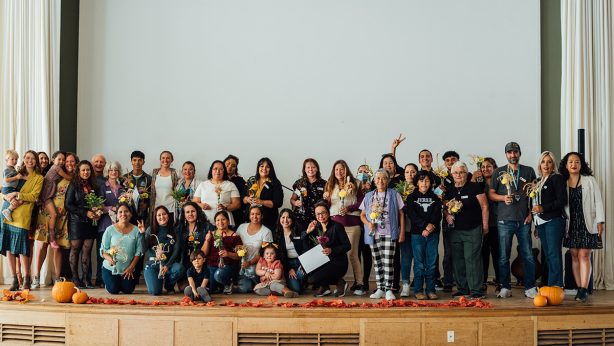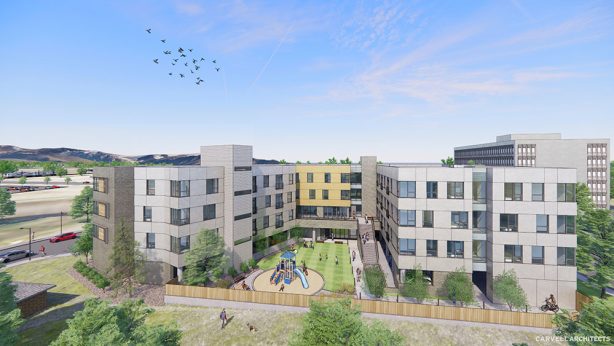Developer and Tenant of Evans Station Lofts Discuss Affordable Housing
With the recent influx of people moving to Denver, and the subsequent elevated cost of living, it should come as no surprise that the city is faced with an affordable housing crisis. In the Denver metro area, there is an estimated 27,000 unit gap in affordable housing options. Thankfully, the community has strong proponents taking strides to help narrow the housing gap, allowing Denver natives to stay in their city.
One of these key players is Troy Gladwell, Founder and Principal of Medici Communities. Gladwell has been working in the affordable housing arena since the 1990’s, when he worked for a developer in Maine. Since moving back to Denver, he remained involved and has been a part of numerous affordable housing projects in the area.
One of Medici Communities’ most recent developments is Evans Station Lofts, an affordable housing complex comprised of 50 units. The land was originally purchased by the Urban Land Conservancy in 2011 using the Transit-Oriented Development Fund as the space is adjacent to the light rail. To the average passersby, Evans Station looks like a beautiful, restored warehouse. It is by no means your traditional affordable housing project with its vaulted ceilings, state of the art appliances and rooftop terrace. Gladwell explained that he takes pride in building affordable units with the best quality possible.
“If you can make it nicer and it doesn’t cost you more money, you should do it,” Gladwell said. “If you can make it nicer just by paying attention and adding things that don’t increase the cost, you should do those things.”
Gladwell explained that for the 50 unit, five story building, opting for certain upgrades occasionally did up the cost initially, but made much more sense in the long run. Using blown glass fiber as the buildings insulation for example cost roughly $19,000 more, but will save tremendous amounts of energy down the road. Other additions included higher ceilings and free WiFi for all of the residents. It is small changes like these that make a major difference for the tenants.
Linda Nechrony is a current resident at Evans Station and has been since August of 2014. For her, getting the offer to live at Evans Station was completely life changing. Prior to her residency, Nechrony lived in Mexico for four years. Between healthcare and rent, she could live affordably, which was no longer the case here in Denver. She described her attempt at finding an affordable place to live in Denver, while still residing in Mexico. Between countless phone calls and a nine month long waiting list, she was offered a one bedroom unit at Evans Station.
However, as she is living off of her pension and currently working part time, she relied on the Denver Rescue Mission’s help to pay her deposit and first month’s rent.
“I’m a degreed person, and I went to the Denver Rescue Mission for help,” Nechrony said. “That is just how things are going.”
Unfortunately, due to the lack of affordable housing options in the metro area, waiting lists are commonplace – and long. Gladwell admitted that upon completion of the apartment complex, Evans station was fully leased in three days and fully occupied only three weeks later.
Deseree Duran is the Assistant Manager at Evans Station, and said that due to a lack of other affordable options, the apartment’s waiting list is now longer than in the past. Duran has worked at Evans Station for two years now, and recognizes the current crisis many families face in finding a place to call home that they can afford.
“…Not everyone can afford the rental rates out there,” Duran said. “So many more people need affordability. It is getting to the point where people who have lived in Denver their entire lives, that are natives, are having to move out.”
While Denver is pulling its weight in many ways with certain programs and tax incentives to increase affordable options for those who need it most, the housing gap is only growing. Gladwell explained that in many ways, lowering the development costs (as opposed to increasing funding) should be the key focus. On average, Gladwell said it costs roughly $8,000 to build an apartment unit in Denver, while that same unit would cost nearly $25,000 in Fort Collins. Gladwell added that Evans Station Lofts did not cost more money than other similar properties. With this insight, it is imperative for other developers to follow Medici Communities’ lead and build affordable.
“I’ve always known that this is the largest expense that people have,” Gladwell said. “It’s nice to feel good about having a good impact on providing housing that people can afford.”



